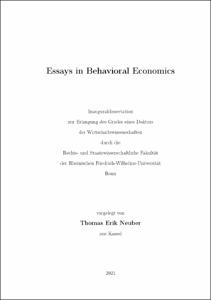Essays in Behavioral Economics

Essays in Behavioral Economics

| dc.contributor.advisor | Dohmen, Thomas | |
| dc.contributor.author | Neuber, Thomas Erik | |
| dc.date.accessioned | 2021-08-26T12:28:31Z | |
| dc.date.available | 2021-08-26T12:28:31Z | |
| dc.date.issued | 26.08.2021 | |
| dc.identifier.uri | https://hdl.handle.net/20.500.11811/9281 | |
| dc.description.abstract | This thesis consists of five chapters that contribute to understanding the consequences, measurement, and origins of heterogeneity in preferences.
Underneath this overarching topic, several different threads are weaving together the elements of this thesis.
The first such theme is introspection, the second prosocial and moral decision-making, and a third the combination of behavioral and survey measures.
The first two chapters study individual behavior in the domains of fairness and helping. In line with the idea that emotional introspection is a key mechanism by which people understand normative obligations and needs, both chapters provide evidence from lab experiments that people intuitively tend to act like they would want others to act. Specifically, the first chapter shows that people prioritize norms from which they benefit themselves, even when unaffected by their own behavior. Similarly, the main result of the second chapter is that in deciding about help, own preferences influence the appreciation of others' utility. The third chapter moves the focus from the individual to the group. Two lab experiments show that when responsibility is diffused among different people, moral behavior decays. The fourth chapter relates to the first two in that it is concerned with introspection. We theoretically and empirically explore how self-knowledge can be inferred from the compression of survey answers and demonstrate that corresponding estimates can improve survey evidence. The last chapter is itself based on survey data. It contributes to understanding the origins of global heterogeneity in preferences, finding that countries' historical experience with statehood has shaped their present levels of patience. | en |
| dc.language.iso | eng | |
| dc.rights | In Copyright | |
| dc.rights.uri | http://rightsstatements.org/vocab/InC/1.0/ | |
| dc.subject | Verhaltensökonomik | |
| dc.subject | Experimentelle Wirtschaftsforschung | |
| dc.subject | Fairness | |
| dc.subject | Prosozialität | |
| dc.subject | Umfrageforschung | |
| dc.subject | Zeitpräferenz | |
| dc.subject | Behavioral economics | |
| dc.subject | Experimental economics | |
| dc.subject | Prosocial behavior | |
| dc.subject | Survey research | |
| dc.subject | Time discounting | |
| dc.subject.ddc | 330 Wirtschaft | |
| dc.title | Essays in Behavioral Economics | |
| dc.type | Dissertation oder Habilitation | |
| dc.publisher.name | Universitäts- und Landesbibliothek Bonn | |
| dc.publisher.location | Bonn | |
| dc.rights.accessRights | openAccess | |
| dc.identifier.urn | https://nbn-resolving.org/urn:nbn:de:hbz:5-63667 | |
| ulbbn.pubtype | Erstveröffentlichung | |
| ulbbnediss.affiliation.name | Rheinische Friedrich-Wilhelms-Universität Bonn | |
| ulbbnediss.affiliation.location | Bonn | |
| ulbbnediss.thesis.level | Dissertation | |
| ulbbnediss.dissID | 6366 | |
| ulbbnediss.date.accepted | 19.08.2021 | |
| ulbbnediss.institute | Rechts- und Staatswissenschaftliche Fakultät / Fachbereich Wirtschaftswissenschaften : Bonn Graduate School of Economics (BGSE) | |
| ulbbnediss.fakultaet | Rechts- und Staatswissenschaftliche Fakultät | |
| dc.contributor.coReferee | Valencia Caicedo, Felipe | |
| ulbbnediss.contributor.gnd | 1240255527 |
Dateien zu dieser Ressource
Das Dokument erscheint in:
-
E-Dissertationen (288)




